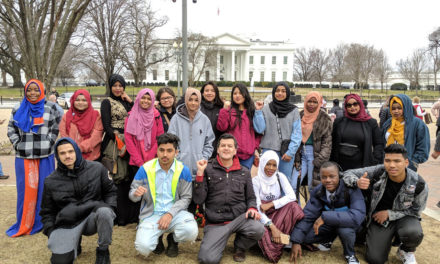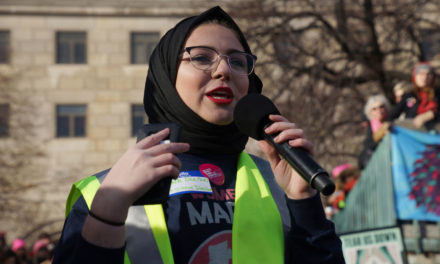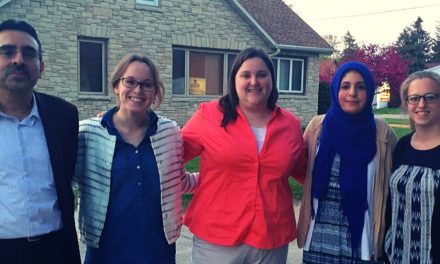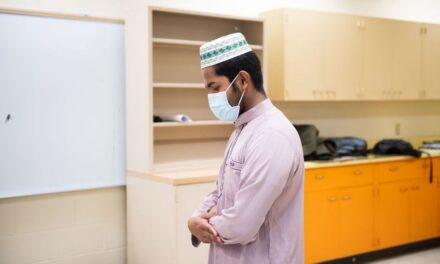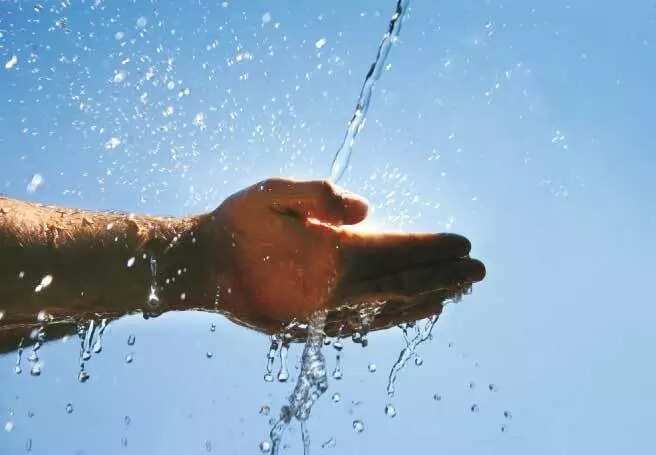
Washing the bodies of deceased Muslim brothers or sisters is meaningful and rewarding, Milwaukee Muslim volunteers say.
Imam Yaseen Domineck, 45, director of the Milwaukee Muslim Funeral Home, helped wash a Muslim brother for burial for the first time in 2003 when he was in his twenties.
“I was living in Minnesota at the time,” he recalled. “Unfortunately, we were having an increase in deaths among young people in our community. One of them was someone I knew.”
Domineck was familiar with “the textbook version” of Islamic burial preparation but had no practical experience. “The family wanted me to be involved, so I joined another person who usually assisted with washing bodies for burial. Afterward, I felt this is an experience more of us need to have.”
“It’s a blessing and honor to help our brother or sister with their final rights,” Domineck said. “It’s a reward as well. And it’s part of being in the community.”
Today a small cadre of men and women in Southeast Wisconsin volunteer to assist with Islamic washing and shrouding bodies for burial. Wisconsin Muslim Journal interviewed a few of those men and women about the responsibility and rewards they experience from providing this service and plans to make training available for others.
The blessings of service
Some of Inshirah Farhoud’s reasons for assisting with Islamic washing of bodies are selfish, the nurse practitioner at the Medical College of Wisconsin admitted. “It helps keep me on track. It compels me to do better. It’s a constant reminder that I’m going to be next on the table.”
She recalled her father’s friend who had severe heart problems. He asked Farhoud’s father to take care of his family when he died. “My father ended up dying 15 years before him. You never know when your time will be.”
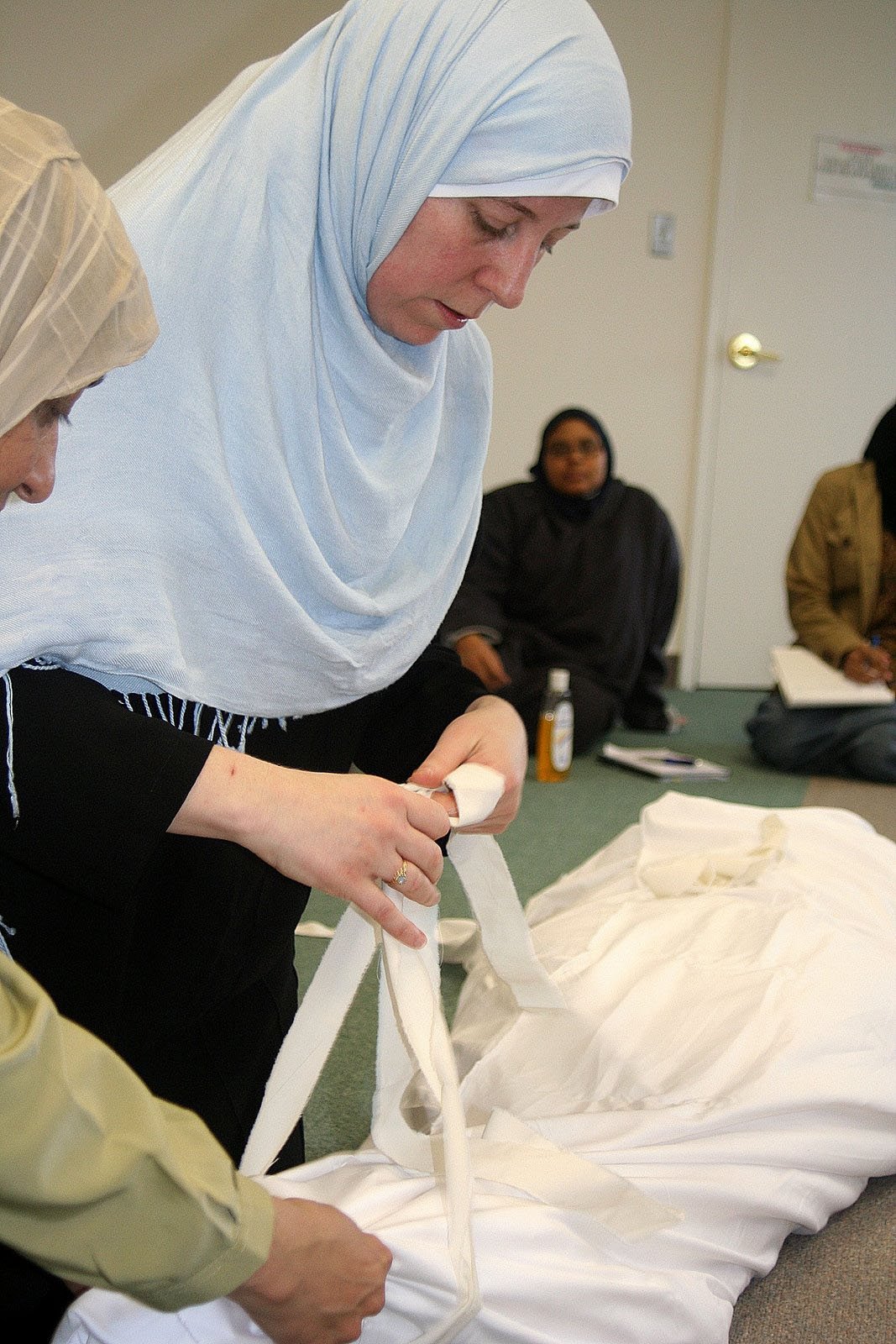
Photo by Andrea Useem
Two women demonstrate wrapping a body for an Islamic burial to volunteers in training.
Serving families when they are going through a death “is a reminder to be conscious of our actions because we may be next,” she said. “It is also a really nice experience to support a family, just being there with them, not necessarily with words but by our presence. Supporting a family when someone has died is something I really felt the need to do for my community.”
More than 30 years ago, Farhoud asked an elder in Milwaukee’s Muslim community to teach her Islamic washing for burial. The woman she asked, Intisar Atta, the mother of Milwaukee Muslim Women’s Coalition founder Janan Najeeb, was one of the first women serving in this capacity in Milwaukee’s Muslim community.
Farhoud wanted to learn more about her faith, to fulfill this Islamic obligation and to support families in the community, she said. “I’m a nurse and I have worked in hospice. I had experienced death, serving people of many different backgrounds, religions and ethnicities. I wanted to see how it goes in our community. What does Islam teach about this time, the end of life? I wanted to support our community the way it should be supported.”
Atta mentored Farhoud, who continues to serve in this role.
Like Farhoud, Jessie Kramer has medical experience. As a surgical technician for 25 years, the Milwaukee Muslim worked at Children’s Hospital of Wisconsin with organ donation and with tissue donation at the Blood Center of Wisconsin.
The first time she assisted with preparing a Muslim body for burial was two or three years ago. “A sister had an autopsy. In that case, she came from the morgue with incisions that needed to be sutured. I have experience doing that,” Kramer told WMJ. “That’s what they needed me for in the beginning. They continue to call me for these types of situations.”
Why does she volunteer to help prepare bodies for Muslim burials?
“It’s our duty as Muslims to take care of our deceased,” she said. “I consider them as my sisters. When I pass away, that’s what I’d want somebody to do for me. I’d want somebody that’s dignified and respectful to wash my body and prepare me for burial.”
“Death is one of those things we don’t like to talk about,” Domineck said, “but it’s our only reality. The only guarantee in this life is that we are going to die. Being prepared to take care of our family and our community at the time of death gives relief,” he said. “We know we will be able to take care of them when the time comes.
“In my personal view, everyone that’s Muslim should know this. We never know what situation we’ll be in or where we might be, when we might need to help another Muslim.”
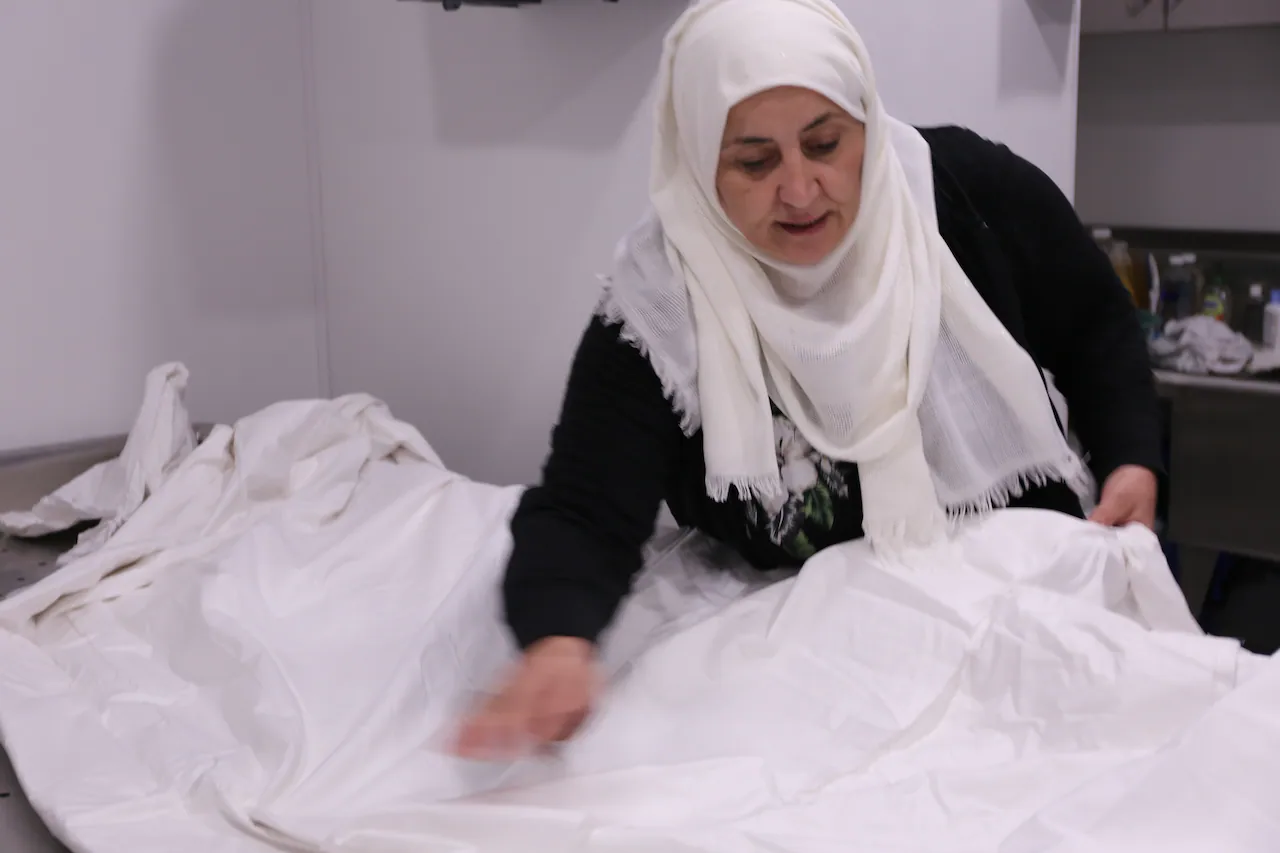
Photo by Ariel Fournier/CBC
A licensed Muslim funeral director demonstrates the process of shrouding.
Like Farhoud, Domineck also appreciates how caring for others in this way reminds us of our own death. “At some point, we are going to die. When? Where? We don’t know.”
It helps him realize the need “to always be right with others, have your affairs in order, don’t be angry with people or have problems with people, have a clean heart. Ask for and give forgiveness. Keep things right because you may not have the chance to fix them.
“Don’t put things off. Whatever acts of worship that we can do for Allah, let’s do it,” he added, noting that preparing a body for burial is an act of worship.
Answering the call
As the Milwaukee Muslim Funeral Home Director, Domineck is contacted about deaths in the community. Calls come from Milwaukee, Oak Creek, Franklin, Kenosha, Racine, Sheboygan, Waukesha, Pewaukee—just about everywhere in Southeastern Wisconsin, he said.
Domineck’s first step is to ask if family members know how to wash the body.
“If they are already educated and willing to participate, that’s what happens,” he said. If not, he sends out a text message on one of two WhatsApp groups (one for men and one for women) of people on call to assist. Their ages range from 19 to community elders, Domineck said.
“It is always last-minute notice,” Kramer said. Islamic religious law calls for the burial as soon as possible, usually within 24 hours of death.
While the chat groups together have about 30 members, many volunteers work full-time jobs. Others have childcare or caregiver responsibilities, or other obligations. Some need transportation.
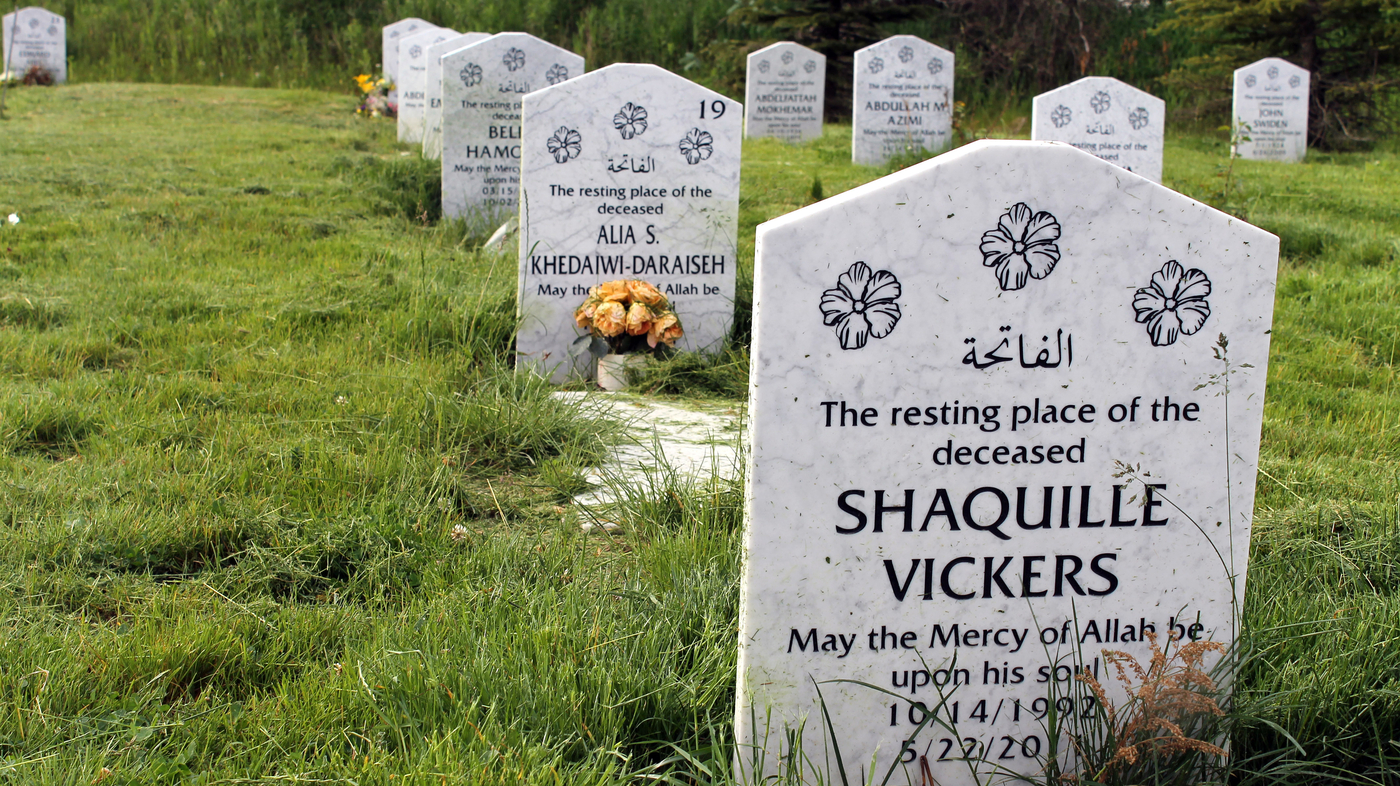
Photo by Sami Yenigun/NPR
Muslims are buried with their heads facing the Kaaba, the house of God in Mecca, Saudi Arabia.
“The way it is now, we are struggling, especially if there are no family members who can help,” Kramer said. “Ideally there would be family members to prepare their loved one’s body. That doesn’t happen in every case.”
It takes about three people to wash and shroud a body, Domineck said, although on occasion he has had to do it alone. Sometimes family members or friends help and just need someone to lead them. Sometimes, they are familiar with the ritual but not ready to do it on their own.
Farhoud especially values the opportunity to serve people who do not have anyone else. “I try to make myself available for all,” she explained. “When Brother Will Perry was in charge, I told him, if nobody is there, call me. I will take off work and go.
“It doesn’t matter what ethnic background or status or if I know them or not, I would try to go,” she said.
“One thing I’ve learned through this is that each ethnic group understands the ritual of Muslim burial a little bit differently. As long as it’s not haram (forbidden) and it’s comforting to the family, let them do it. This is not the time to argue with a family about misunderstandings. It’s a time to support the family.”
The importance of learning
“Whenever I have an opportunity, I bring in young people to witness the washing,” Domineck said. “They start becoming familiar with the process.”
Domineck is planning a short seminar in October “on the whole process from A to Z.” It will help all participants prepare for our own deaths and the deaths of others in the community, he explained. “It will include a demonstration of washing with a mannequin or volunteer and a review of other important things we all need to know.”
Learning the Islamic method of washing and shrouding a body is important because these are part of worship, Domineck explained. “There a lot of misunderstandings and misconceptions in our community about the rituals of burial,” he said. “Even myself, a revert (a convert to Islam), grew up with certain practices that are totally different from the Islamic process.
“We also have Muslims from different countries who have things they’ve added from their culture that don’t necessarily have anything to do with the Islamic process. Some things may even contradict the Islamic process. We need to do what our prophet taught us to do.
“The washing, burial and Janazah (funeral) prayer are all part of worship. If it’s worship, we have to adhere to what has been revealed to us.” Learning the Islamic process ensures that when the time comes, Muslims know what to do, he said.
In addition to volunteering to help prepare bodies for burial, Muslims can offer financial support, Domineck noted. The Milwaukee Muslim Funeral Home “is not a business,” he said. “Donations keep things operating so we can provide funeral services. We don’t turn anyone away. At the end of the day, these are our brothers and sisters.”
